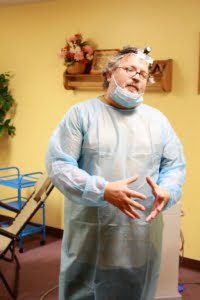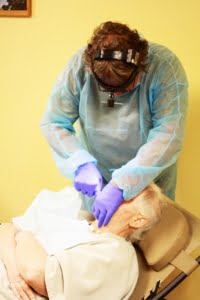From the Spring 2016 Journal of the Colorado Dental Association
Access to dental care in rural communities in Colorado continues to be a hot button issue in the state. In underserved areas, seeking treatment from a dentist isn’t always as easy as calling up a local dental practice, Federally Qualified Health Center, or Community-Based Dental Clinic and making an appointment. It sometimes involves taking time off of work and traveling substantial distances to a dental practice. In extreme cases, patients might forego treatment, causing their dental problems to persist or escalate, forcing them to visit the emergency room instead of a dentist.
 That’s why one dentist, Dr. Arnold Cullum of Colorado Springs, Colo., has taken it upon himself, with the help of his business partner and nonprofit consultant Annette Zacharias, to make a difference—via a mobile dental clinic he calls Rural Dental Centers. A private dentist who owns two practices in Colorado, Dr. Cullum finds time where time doesn’t necessarily exist because his passion about this cause is so strong.
That’s why one dentist, Dr. Arnold Cullum of Colorado Springs, Colo., has taken it upon himself, with the help of his business partner and nonprofit consultant Annette Zacharias, to make a difference—via a mobile dental clinic he calls Rural Dental Centers. A private dentist who owns two practices in Colorado, Dr. Cullum finds time where time doesn’t necessarily exist because his passion about this cause is so strong.Recognizing a Need in Rural Colorado
Based on statistics in the American Dental Association Health Policy Institute (HPI) report, “The Oral Health Care System: A State-by-State Analysis,” the outreach and dedication by the CDA and its member dentists to improve access to dental care across the state have been working. According to data from the HPI report, the percentage of children with Medicaid coverage who visited a dentist over a 12-month period increased from 35% in 2005 to 48% in 2013. That’s thanks in part to more Colorado dentists participating in Medicaid since the inception of the adult dental benefit. The report also showed that from 2001 to 2013 the number of dentists per every 100,000 Colorado residents increased from 64.3 to 68.7, which is higher than the statistic for the entire U.S., which stands at 60.5 per every 100,000 individuals.
But despite this news, more can be done, and that’s where dentists like Dr. Cullum come in because they understand the need and are passionate about finding a solution.
Dr. Cullum hopes his traveling clinic and nonprofit will relieve a burden for remote, low-income households throughout the state that struggle with access to a nearby dentist.
In some cases, patients might have access to a nearby dentist, but if that dentist doesn’t accept Medicaid, those patients can end up traveling farther away to find a dentist who does accept their insurance. These patients might travel hours, coming from what some call “dental deserts”—areas on the eastern plains and western slopes with sparse populations and rural economies that cannot support full-time dental practices.
“Our goal is to eradicate the so called dental desert and make sure every single county in Colorado will have a dental home for patients,” Dr. Cullum says.
By the time these patients find a way to make the trips, pain is often excruciating and problems are severe. Conditions that started as minor tooth decay have become complicated and expensive, requiring two or more return trips to the closest dental facility or clinic.
Making of a Mobile Dental Clinic
In 2015, Dr. Cullum established Rural Dental Centers by investing $100,000 in a vehicle and travel trailer equipped as a full-service, state-of-the art dental clinic on wheels. He travels the state, bringing dental services to Medicaid patients and others who would otherwise incur the substantial costs of travel or, even worse, continue postponing services they or their children need.
Where did the idea come to him? It turns out helping others is a family affair.
“My dad did a lot of donated dentistry, so I just felt I should do something to give back,” Dr. Cullum says.
To help uninsured, non-Medicaid patients afford the mobile service, Dr. Cullum also established the nonprofit Dental Solutions for Health with the assistance of Zacharias. The charity raises money for people who have no dental insurance and do not qualify for Medicaid.
The patients that this service helps are individuals and families, young and old, who fall through the cracks. They typically do not qualify for government assistance programs.

“These are nice, quiet, passive people who are the last to ask for help,” Dr. Cullum says. “They are people who work hard and don’t say anything, but they can’t really afford to travel hundreds of miles, let alone pay for care. They are the kind of people I want to help.”
Identifying the Right Communities
Dr. Cullum and Zacharias use data available to them regarding the state’s areas with limited dental access to identify potential communities to help. Then they visit those communities and make sure the data is correct and that there are no nearby dentists.
“Dr. Cullum is such an advocate for private dentists in a community,” Zacharias says. “If a community has a dentist nearby, we will ask if he or she needs help. If not, we cross that community off the list and move on to the next one. We want to step in where communities can’t sustain a dental practice.”
Once communities are identified, Dr. Cullum and Zacharias put their grassroots efforts to work, visiting anything from local community centers and food pantries to hardware shops and liquor stores—anywhere members of the community gather, says Zacharias. They talk with people and find out about the need for dental care and where Dr. Cullum can set up shop. Many of the people they talk with break down in tears when they realize help is on the way.
A Sustainable Solution
Right now, only weekend appointments are available, and that’s by design. Most of the patients Dr. Cullum treats are considered the “working poor,” who typically work Monday through Friday, along with some weekends. Rural Dental Centers offers appointments on Saturdays from 2 p.m. to 8 p.m. and all day Sundays to accommodate this population.
Community partnerships—with food pantries and community centers, for example—are important because it’s through these organizations that patients are identified and appointments are scheduled. The need is so high that all of the available time slots are filled before Dr. Cullum even gets to town that weekend.
But this isn’t a one-size-fits-all solution, and Dr. Cullum and Zacharias know that.
“Each community is going to look different,” says Zacharias. “Some will have a physical location—an unused space that previously served as a dental office, for example—and some will be portable, making use of a community center. Dr. Cullum is determined to listen to the communities and set up a tailored and sustainable option for each individual community.”
This isn’t a one-time visit, either. Dr. Cullum is passionate about making sure he and his volunteer dental teams regularly visit these communities, whether it’s every six weeks, every 12 weeks or even once a month.
Getting a Helping Hand
Dr. Cullum and Zacharias hope they can be the bridge between interested dentists and the communities in need of oral healthcare.
Many dentists, Dr. Cullum explained, would like to help low-income children and adults but start-up costs and high overhead can obstruct even the best intentions.
“This service provides an opportunity for dentists to come out and help,” Dr. Cullum says, explaining how the portable clinic and nonprofit remove cost barriers to helping Medicaid and uninsured patients. “The dentists get paid fairly, but do not get bogged down in the administrative challenges of incorporating this into daily practice. Most dentists are not in this business for money—they just want to help those in need.”
Dr. Cullum invites other Colorado dentists, hygienists and assistants to help him staff the rolling clinic, offering to pay them a reasonable fee for every six-hour session of work provided.
“Our dream is that we’ll have volunteer dentists fall in love with communities and want to become their local dentist, even though they don’t live in that community,” says Zacharias.
For more information or to participate in this program, contact Annette Zacharias at 970-988-7799.

